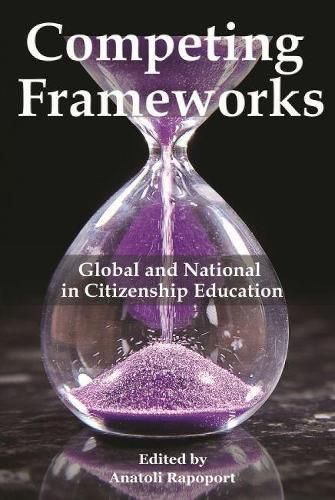Readings Newsletter
Become a Readings Member to make your shopping experience even easier.
Sign in or sign up for free!
You’re not far away from qualifying for FREE standard shipping within Australia
You’ve qualified for FREE standard shipping within Australia
The cart is loading…






This title is printed to order. This book may have been self-published. If so, we cannot guarantee the quality of the content. In the main most books will have gone through the editing process however some may not. We therefore suggest that you be aware of this before ordering this book. If in doubt check either the author or publisher’s details as we are unable to accept any returns unless they are faulty. Please contact us if you have any questions.
For citizenship education in the 21st century, globalization increasingly presents a new challenge and a new opportunity. Since the time when nationalism played a critical role in unifying new nations, nationality and citizenship have been virtually synonymous terms. As a result, the constructed symbiosis of citizenship and national identity has influenced state supported citizenship education in the most profound way. School curricula, particularly in public schools, produced and reinforced the dominant version of citizenship, which is national citizenship. Schools were expected to prepare future loyal citizens who would identify themselves with the nation.
Due to the changing nature and scope of human interactions, the traditional model of citizenship education, however, appears increasingly outdated and deficient to address many contemporary challenges. Thus, schools have become a locus of a potential conflict of two citizenship discourses: the discourse of national citizenship that for a long time has served as the ultimate purpose of public education and the discourse of global citizenship that is forcefully and continuously seeking for a proper place in school curricula despite the lack of curricular heritage. The need for an education for citizenship that has a global scope and is guided by critical and emancipatory approaches becomes more evident. At the same time, the pressure to globalize and internationalize curriculum actively challenges such concepts as patriotism, national identity, loyalty to the state, or national uniqueness of government and democratic development that have been fundamental for citizenship and civic education for decades.
In this book, a group of international scholars present their research about the dynamic development, interplay, and interconnectedness of two major discourses in citizenship education, namely national and global. Case studies and ethnographies from China, Cyprus, Egypt, Hong Kong and Singapore, Lebanon, Liberia, the Netherlands, Russia, and the United States display a multifaceted but yet comprehensive picture of educators’ attempts to promote social justice, global awareness, and multiple loyalties. The volume will appeal to several constituencies: it will be interesting to teachers and teacher educators whose focus of instruction is citizenship education, social studies education, and global education; it will also be interesting to scholars who conduct research in citizenship and global education.
$9.00 standard shipping within Australia
FREE standard shipping within Australia for orders over $100.00
Express & International shipping calculated at checkout
This title is printed to order. This book may have been self-published. If so, we cannot guarantee the quality of the content. In the main most books will have gone through the editing process however some may not. We therefore suggest that you be aware of this before ordering this book. If in doubt check either the author or publisher’s details as we are unable to accept any returns unless they are faulty. Please contact us if you have any questions.
For citizenship education in the 21st century, globalization increasingly presents a new challenge and a new opportunity. Since the time when nationalism played a critical role in unifying new nations, nationality and citizenship have been virtually synonymous terms. As a result, the constructed symbiosis of citizenship and national identity has influenced state supported citizenship education in the most profound way. School curricula, particularly in public schools, produced and reinforced the dominant version of citizenship, which is national citizenship. Schools were expected to prepare future loyal citizens who would identify themselves with the nation.
Due to the changing nature and scope of human interactions, the traditional model of citizenship education, however, appears increasingly outdated and deficient to address many contemporary challenges. Thus, schools have become a locus of a potential conflict of two citizenship discourses: the discourse of national citizenship that for a long time has served as the ultimate purpose of public education and the discourse of global citizenship that is forcefully and continuously seeking for a proper place in school curricula despite the lack of curricular heritage. The need for an education for citizenship that has a global scope and is guided by critical and emancipatory approaches becomes more evident. At the same time, the pressure to globalize and internationalize curriculum actively challenges such concepts as patriotism, national identity, loyalty to the state, or national uniqueness of government and democratic development that have been fundamental for citizenship and civic education for decades.
In this book, a group of international scholars present their research about the dynamic development, interplay, and interconnectedness of two major discourses in citizenship education, namely national and global. Case studies and ethnographies from China, Cyprus, Egypt, Hong Kong and Singapore, Lebanon, Liberia, the Netherlands, Russia, and the United States display a multifaceted but yet comprehensive picture of educators’ attempts to promote social justice, global awareness, and multiple loyalties. The volume will appeal to several constituencies: it will be interesting to teachers and teacher educators whose focus of instruction is citizenship education, social studies education, and global education; it will also be interesting to scholars who conduct research in citizenship and global education.